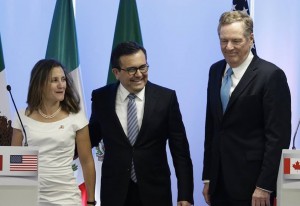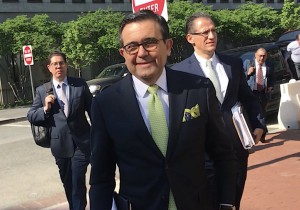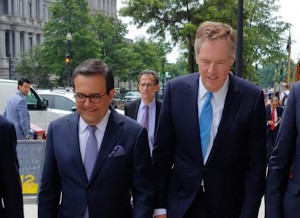
Until all three negotiators say there is a deal, passing the current bilateral will be difficult and take longer than expected.
An air of uncertainty and frustrations once again settled over the discussions surrounding the North American Free Trade Agreement despite the announcement by President Donald Trump and Mexican President Enrique Pena Nieto of tentative agreement on the broad outlines of a new trade pact.
However, no one is yet certain about the specifics needed to make a new pact operational. For example, officials from Kia, which is about to launch a new vehicle made in Mexico, Kia Forte, in the U.S. market said it wasn’t sure about what impact the tentative pack might have on the automobile business. Like everyone else, Kia is waiting for more details, noted James Bell, Kia’s director of corporate communications.
One specific piece of apparently settled under the tentative U.S.-Mexican agreement are the rules of origin, which have increased the requirements from 62.5% to 75%. The new agreement would increase the U.S.-Mexican content in the pact in an effort to draw automotive investment from China to Mexico or the U.S. The rules could penalize Asian carmakers, according to analysts.
However, the Trump administration insulated the U.S. from being overwhelmed by imports from Mexico. In a side agreement, the administration was given the ability to assess a 25% tariff on Mexican-made vehicles, if the country sends over more than 2.4 million annually. Mexico shipped 1.8 million vehicles to the U.S. in 2017. Additionally, if Mexican-made component levels exceed $90 billion annually, the same levy can be imposed.
But organized labor, which has pushed back against this deal for nearly 25 years, has serious reservations about the agreement announced by Trump and Pena Nieto and are adhering to the old rules that applies in negotiating a new agreement that “nothing is settled until everything is settled.”
(New vehicle costs expected to rise under new NAFTA deal. Click Here for the story.)
United Steel Workers President Leo Gerard, UAW President Gary Jones and AFL-CIO President Richard Trumka all signed a statement pointing out the agreement wasn’t finished.
“NAFTA has had a devastating impact on workers for more than 25 years. We are aggressively engaged in suing an agreement that was for working people in all three countries, and we are not done yet. There is more work that needs to be done to deliver the needed, real solutions to NAFTA’s deeply ingrained flaws,” they said.
“Any new deal must raise wages, ensure workers’ rights and freedoms, reduce outsourcing and put the interests of working families first in all three countries. And working people must be able to review the full and final text and have the confidence not only in the terms of the deal, but its implementation, monitoring and enforcement,” they said.
Perhaps more importantly, no deal is done until Congress signs off on it, and some Democrats are already making noise about not fast-tracking the finished product if it is a only a bilateral deal with just Mexico.
Trump threw the ball into Canada’s court when he noted he would inform Congress that he had a only a bilateral agreement if Canada didn’t agree to terms by Friday. He also noted he would institute a 25% tariff on Canadian-built cars.
Canada’s top trade negotiator, Chrystia Freeland, expressed optimism about getting a deal done, although she declined to commit to Trump’s Friday deadline.
(Click Here to see why NAFTA talks halted earlier.)
“We are optimistic about having some very good, productive conversations this week,” Freeland told reporters as she entered the U.S. Trade Representative’s Office Wednesday, according to Reuters.
Domestic carmakers also have reservations about the incomplete deal announced by Trump and Pena Nieto, who will leave office with his entire administration at the end of November, according to their lobbying group, American Automotive Policy Council.
They have concerns about what the deal will mean for cars imported from Asia. Asian as well as German automakers, and automakers and suppliers that want to expand production in Mexico, could be at a disadvantage, and be forced to source more production of both vehicles and engines in the United States.
The AAPC also stressed any agreement must include the U.S. northern neighbor, Canada, where General Motors, Ford Motor Co. and Fiat Chrysler Automobiles N.V. have major operations, which could be severely undermined by any effort by the Trump administration to impose tariffs on Canadian-built vehicles.
“AAPC has supported the negotiations to create a modernized NAFTA, and we are optimistic that the new agreement will maintain and encourage the ongoing competitiveness of the United States and North American auto industries.

Ildefonso Guajardo, Mexico's economy minister, said that if Canada doesn't sign the deal, the pact between the U.S. and Mexico will need some tweaks.
“We will be reviewing the details to ensure it creates a trade environment that allows FCA US, Ford and GM to continue thriving, creating jobs and growing our economy. We commend the United States and Mexican negotiators for their success and urge them to work with their Canadian counterparts to complete this negotiation,” the AAPC said.
(To see more about the U.S., Mexico agreement on NAFTA’s auto provisions, Click Here.)
The harshest commentators, particularly outside the auto industry, observed that Trump also has a penchant for making big pronouncements that generate a lot of media coverage but have little effect on underlying everyday reality. Trump’s knack for showmanship also was apparent in his desire to rename NAFTA, which dates back to the administration of President Ronald Reagan, who was a major champion of the agreement with Mexico and Canada.
Michael Strong contributed to this story.


